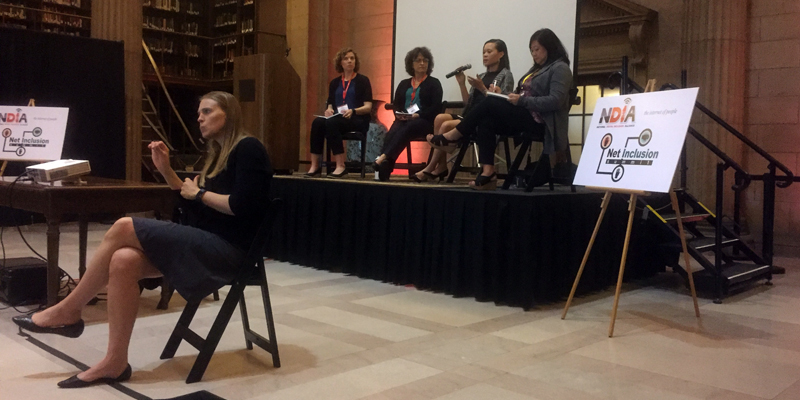At a national conference on digital inclusion, city government experts reached a consensus: access to online resources has evolved beyond a luxury and is now an essential part of living in the United States.
A panel of four city government officials closed out “Net Inclusion 2017,” a May 16-17 conference in St. Paul, Minn., attended by more than 200 community practitioners, academics, technology company representatives and government officials. Participants originated from communities extending from Kodiak Island, Alaska, to a Ponca Indian reservation in north central Oklahoma.
Angela Siefer, director of the National Digital Inclusion Alliance that led the conference, moderated the closing discussion. Panelists Rondella Hawkins of Austin; Vicky Yuki of Seattle; Anne Schwieger of Boston, and McClain Bryant of Kansas City, Mo., discussed how cities are investing in and managing programs to ensure citizens have online access.
At one point, Siefer asked the panel how a city with fewer resources than Austin, Seattle, Boston or Kansas City might address the issue.
“It shouldn’t just be the digital inclusion person or persons raising those issues,” said Anne Schwieger, broadband and digital equity advocate for the City of Boston. “There are decision makers who can move things forward and ask really important things of large groups. You know you can’t be in every single meeting. You need the values of digital inclusion and equity to be diffused across all different things, ideally.”
McClain Bryant, director of policy in the office of the Kansas City mayor, agreed. She said it is especially important for city leaders to embrace these values, and described a series of conversations with Kansas City Mayor Sly James.
“It’s something we are very focused on, so I just kind of kept on him as that one staff person and convinced him of this. I would just say, ‘Hey, this is a basic need. Along with water, utilities and the ability to read and write, this is right there.’ So breaking it down for him to understand it’s a basic need and how it permeates into every other aspect of life. How you cannot excel or compete in today’s economy without digital literacy and access. I think the light bulb went off for him. So we used that same messaging when we presented ourselves to the city council.”
Photo above: Interpreter Tracy Koesel of ASL Interpreting Services (far left, in front). City government panelists Anne Schwieger of Boston; Rondella Hawkins of Austin; McClain Bryant of Kansas City, Mo.; and Vicky Yuki of Seattle (from left, on dais).
PANEL HIGHLIGHTS
The complete panel discussion is available for viewing. Other conference presentations focused on upcoming 5G technologies, government legislation and regulation, technology affordability, workforce development and skills, philanthropy, planning, rural areas, computer refurbishment, data analysis, and other topics.
Problems cannot be solved by the same level of thinking that created them.
— Keynote speaker Maya Wiley, urban policy professor at The New School, quoting Albert Einstein
